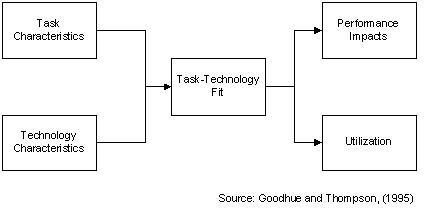Difference between revisions of "Task-technology fit"
m (Text replace - "thumb|right|134px|[http://http://www.prin.edu// Site sponsor] thumb|right|134px|[http://www.yorku.ca/ Site sponsor]" to "") |
|||
| (2 intermediate revisions by 2 users not shown) | |||
| Line 1: | Line 1: | ||
| − | + | {{Sponsor Thumbs}} | |
| Line 27: | Line 27: | ||
Goodhue,Dale L., “Understanding user evaluations of information systems”, Management Science, 1995, 41, 12, 1827-1844. | Goodhue,Dale L., “Understanding user evaluations of information systems”, Management Science, 1995, 41, 12, 1827-1844. | ||
| − | Goodhue,Dale L.;Thompson,Ronald L., | + | Goodhue,Dale L.;Thompson,Ronald L., “[http://inn.colorado.edu/Details/Paper/150 Task-technology fit and individual performance]”, MIS Quarterly, 1995, 19, 2, 213-236. |
Zigurs,Ilze;Buckland,Bonnie K., “A theory of task/technology fit and group support systems effectiveness”, MIS Quarterly, 1998, 22, 3, 313-334. | Zigurs,Ilze;Buckland,Bonnie K., “A theory of task/technology fit and group support systems effectiveness”, MIS Quarterly, 1998, 22, 3, 313-334. | ||
| + | |||
== Originating area == | == Originating area == | ||
Information Systems | Information Systems | ||
| Line 67: | Line 68: | ||
Kankanhalli, A., Tan, B. C. Y., and Wei, K. K. "Understanding Seeking from Electronic Knowledge Repositories: An Empirical Study," Journal of the American Society for Information Science and Technology (56:11), 2005, pp. 1156-1166. | Kankanhalli, A., Tan, B. C. Y., and Wei, K. K. "Understanding Seeking from Electronic Knowledge Repositories: An Empirical Study," Journal of the American Society for Information Science and Technology (56:11), 2005, pp. 1156-1166. | ||
| − | Karimi,Jahangir;Somers,Toni M.;Gupta,Yash P., | + | Karimi,Jahangir;Somers,Toni M.;Gupta,Yash P., “[http://inn.colorado.edu/Details/Paper/6811 Impact of Environmental Uncertainty and Task Characteristics on User Satisfaction with Data], “Information Systems Research, 2004, 15, 2, 175-193. |
Klopping,Inge M.;McKinney,Earl, “Extending the Technology Acceptance Model and the Task-Technology Fit Model to Consumer E-Commerce”, Information Technology, Learning, and Performance Journal, 2004, 22, 1, 35-48. | Klopping,Inge M.;McKinney,Earl, “Extending the Technology Acceptance Model and the Task-Technology Fit Model to Consumer E-Commerce”, Information Technology, Learning, and Performance Journal, 2004, 22, 1, 35-48. | ||
| − | Lim, K., I. Benbasat, "The Effect of Multimedia on Perceived Equivocality and Perceived Usefulness of Information Systems", MIS Quarterly, Vol. 24, No. 3, 2000, p. 449-471. | + | Lim, K., I. Benbasat, "[http://inn.colorado.edu/Details/Paper/139 The Effect of Multimedia on Perceived Equivocality and Perceived Usefulness of Information Systems]", MIS Quarterly, Vol. 24, No. 3, 2000, p. 449-471. |
Maruping,Likoebe M.;Agarwal,Ritu, “Managing Team Interpersonal Processes Through Technology: A Task-Technology Fit Perspective”, The Journal of Applied Psychology, 2004, 89, 6, 975-990. | Maruping,Likoebe M.;Agarwal,Ritu, “Managing Team Interpersonal Processes Through Technology: A Task-Technology Fit Perspective”, The Journal of Applied Psychology, 2004, 89, 6, 975-990. | ||
| Line 82: | Line 83: | ||
Zigurs, I., Buckland, B., Connolly, J., & Wilson, E.V. "A test of task-technology fit theory for group support systems", Data Base for Advances in Information Systems, 1999, 30(3,4), 34-50. | Zigurs, I., Buckland, B., Connolly, J., & Wilson, E.V. "A test of task-technology fit theory for group support systems", Data Base for Advances in Information Systems, 1999, 30(3,4), 34-50. | ||
| + | |||
== Links from this theory to other theories == | == Links from this theory to other theories == | ||
[[Evolutionary theory]], Fit theories | [[Evolutionary theory]], Fit theories | ||
Latest revision as of 23:24, 10 December 2014

Task technology fit
Acronym
TTF
Alternate name(s)
N/A
Main dependent construct(s)/factor(s)
Individual performance, System utilization
Main independent construct(s)/factor(s)
Task characteristics, Technology characteristics
Concise description of theory
Task-technology fit (TTF) theory holds that IT is more likely to have a positive impact on individual performance and be used if the capabilities of the IT match the tasks that the user must perform (Goodhue and Thompson, 1995). Goodhue and Thompson (1995) developed a measure of task-technology fit that consists of 8 factors: quality, locatability, authorization, compatibility, ease of use/training, production timeliness, systems reliability, and relationship with users. Each factor is measured using between two and ten questions with responses on a seven point scale ranging from strongly disagree to strongly agree.
Goodhue and Thompson (1995) found the TTF measure, in conjunction with utilization, to be a significant predictor of user reports of improved job performance and effectiveness that was attributable to their use of the system under investigation.
Although the Goodhue and Thompson (1995) model operates at the individual level of analysis, Zigurs and Buckland (1998) present an analogous model operating at the group level. Since the initial work, TTF has been applied in the context of a diverse range of information systems including electronic commerce systems and combined with or used as an extension of other models related to IS outcomes such as the technology acceptance model (TAM). The TTF measure presented by Goodhue and Thompson (1995) has undergone numerous modifications to suit the purposes of the particular study.
Diagram/schematic of theory
Originating author(s)
Goodhue (1995), Goodhue and Thompson (1995) - Individual level
Zigurs and Buckland (1998) -- group level
Seminal articles
Goodhue,Dale L., “Understanding user evaluations of information systems”, Management Science, 1995, 41, 12, 1827-1844.
Goodhue,Dale L.;Thompson,Ronald L., “Task-technology fit and individual performance”, MIS Quarterly, 1995, 19, 2, 213-236.
Zigurs,Ilze;Buckland,Bonnie K., “A theory of task/technology fit and group support systems effectiveness”, MIS Quarterly, 1998, 22, 3, 313-334.
Originating area
Information Systems
Level of analysis
Individual
IS articles that use the theory
Cane, Sheila, McCarthy, Richard and Halawi, Leila (2010). Training Military Commanders with Simulation: A Phenomenological Study of Task-Technology Fit .Journal of Computer Information Systems, Volume 50, Issue 3, 33-40.
D'Ambra,John;Rice,Ronald E., “Emerging factors in user evaluation of the World Wide Web”, Information and Management, 2001, 38, 6, 373-384.
D'Ambra,John;Wilson,Concepcion S., “Explaining perceived performance of the World Wide Web: uncertainty and the task-technology fit model”, Internet Research, 2004, 1, 4, 294-310.
D'Ambra,John;Wilson,Concepcion S., Use of the World Wide Web for international travel: Integrating the construct of uncertainty in information seeking and the task-technology fit (TTF) model”, Journal of the American Society for Information Science and Technology, 2004, 55, 8, 731-742.
Dennis,Alan R.;Wixom,Barbara H.;Vandenberg,Robert J., “Understanding Fit and Appropriation Effects in Group Support Systems Via Meta-Analysis”, MIS Quarterly, 2001, 25, 2, 167-193.
Dishaw,Mark T.;Strong,Diane M., “Extending the technology acceptance model with task-technology fit constructs”, Information & Management, 1999, 36, 1, 9-21.
Dishaw,Mark T.;Strong,Diane M., “Assessing software maintenance tool utilization using task-technology fit and fitness-for-use models”, Journal of Software Maintenance: Research and Practice, 1998, 10, 3, 151-179.
Dishaw,Mark T.;Strong,Diane M., "Supporting software maintenance with software engineering tools: A Computed task-technology fit analysis”, Journal of Systems and Software, 1998, 44, 2, 107-120.
Ferratt,T. W.;Vlahos,G. E., “An investigation of task-technology fit for managers in Greece and the US.”, European Journal of Information Systems, 1998, 7, 2, 123-136.
Gebauer,Judith;Shaw,Michael J., “Success Factors and Impacts of Mobile Business Applications: Results from a Mobile e-Procurement Study”, International Journal of Electronic Commerce, 2004, 8, 3, 19-41.
Goodhue,Dale, “The Model Underlying the Measurement of the Impacts of the IIC on the End-Users”, Journal of the American Society for Information Science, 1997, 48, 5, 449-453.
Goodhue,Dale L., “Development and measurement validity of a task-technology fit instrument for user evaluations of information systems”, Decision Sciences, 1998, 29, 1, 105-138.
Goodhue,Dale L., “Understanding user evaluations of information systems”, Management Science, 1995, 41, 12, 1827-1844.
Goodhue,Dale L.;Klein,Barbara D.;March,Salvatore T., “User evaluations of IS as surrogates for objective performance”, Information & Management, 2000, 38, 2, 87-101.
Kankanhalli, A., Tan, B. C. Y., and Wei, K. K. "Understanding Seeking from Electronic Knowledge Repositories: An Empirical Study," Journal of the American Society for Information Science and Technology (56:11), 2005, pp. 1156-1166.
Karimi,Jahangir;Somers,Toni M.;Gupta,Yash P., “Impact of Environmental Uncertainty and Task Characteristics on User Satisfaction with Data, “Information Systems Research, 2004, 15, 2, 175-193.
Klopping,Inge M.;McKinney,Earl, “Extending the Technology Acceptance Model and the Task-Technology Fit Model to Consumer E-Commerce”, Information Technology, Learning, and Performance Journal, 2004, 22, 1, 35-48.
Lim, K., I. Benbasat, "The Effect of Multimedia on Perceived Equivocality and Perceived Usefulness of Information Systems", MIS Quarterly, Vol. 24, No. 3, 2000, p. 449-471.
Maruping,Likoebe M.;Agarwal,Ritu, “Managing Team Interpersonal Processes Through Technology: A Task-Technology Fit Perspective”, The Journal of Applied Psychology, 2004, 89, 6, 975-990.
Mathieson,Kieran;Keil,Mark, "Beyond the interface: Ease of use and task/technology fit”, Information & Management, 1998, 34, 4, 221-230.
Shirani,Ashraf I.;Tafti,Mohammed H. A.;Affisco,John F., “Task and technology fit: a comparison of two technologies for synchronous and asynchronous group communication”, Information & Management, 1999, 36, 3, 139-150.
Staples,D. Sandy;Seddon,Peter, “Testing the Technology-to-Performance Chain Model”, Journal of Organizational and End User Computing, 2004, 16, 4, 17-36.
Zigurs, I., Buckland, B., Connolly, J., & Wilson, E.V. "A test of task-technology fit theory for group support systems", Data Base for Advances in Information Systems, 1999, 30(3,4), 34-50.
Links from this theory to other theories
Evolutionary theory, Fit theories
External links
http://business.clemson.edu/ISE/html/instruments.html, AIS offers an electronic version of the Goodhue and Thompson (1995) TTF instrument
Original Contributor(s)
Brent Furneaux
Please feel free to make modifications to this site. In order to do so, you must register.
Return to Theories Used in IS Research
